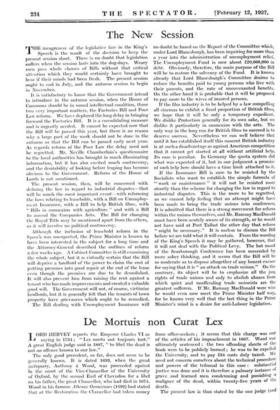The New Session
TILE meagreness of the legislative fare in the King's Speech is the result of the decision to keep the present session short. There is no doubt that legislation suffers when the session lasts into the dog-days. Weary men pass whole clauses of Bills without that critical attention which they would certainly have brought to bear if their minds had been fresh. The present session ought to end in July, and the autumn session to begin in November.
It is satisfactory to know that the Government intend to introduce in the autumn session, when the House of Commons should be in sound intellectual condition, those two very important matters, the Factories Bill and Poor Law reform. We have deplored the long delay in bringing forward the Factories Bill. It is a consolidating measure and is urgently needed. It cannot be expected now that the Bill will be passed this year, but there is no reason why a large part of the work should not be done in the autumn so that the Bill can be passed early next year: As regards reform of the Poor Law the delay need not be regretted. Mr. Neville Chamberlain's questionnaire to the local authorities has brought in much illuminating information, but it has also excited much controversy, and the desirability of looking before leaping has become obvious to the Government. Reform of the House of Lords is not mentioned.
The present session, then, will be concerned with defining the law in regard to industrial disputes—that will be much the most important eventwith reforming the laws relating to leaseholds, with a Bill on Unemploy- ment Insurance, with a Bill to help British films, with " Bills in connexion with agriculture " and with a Bill to amend the Companies Acts. The Bill for changing the Royal Title may be mentioned apart from the others, as it will involve no political controversy.
Although the inclusion of leasehold reform in the Speech was unexpected, the Prime Minister is known to have been interested in the subject for a long time and the Attorney-General described the outlines of reform a few weeks ago. A Cabinet Committee is still examining the whole subject, but it is virtually certain that the Bill will deprive a landlord of the power to claim the cost of putting premises into good repair at the end of the lease even though the premises are clue to be demolished. It will also prevent him from raising the rent against a tenant who has made improvements and created a valuable good will. The Government will not, of course, victimize landlords, but it is generally felt that the tenants of town property have grievances which ought to be remedied.
The Bill dealing with Unemployment Insurance will no doubt be based on the Report of the Committee which; under Lord Blanesburgh, has been inquiring for more than a year into the administration of unemployment relief. The Unemployment Fund is now about £20,000,000 in debt. Obviously, therefore, the main purpose of the Bill will be to restore the solvency of the Fund. It is known already that Lord Blanesburgh's Committee desires to reduce the benefits paid to young persons who live with their parents, and the " rate of uncovenanted benefits. On the other hand it is probable that it will be proposed to pay more to the wives of insured persons.
If the film industry is to be helped by a law compelling all cinemas to exhibit a fixed proportion of British films, we hope that it will he only a temporary expedient. We dislike Protection generally for its own sake, but we dislike it particularly in connexion with the arts. The only way in the long run for British films to succeed is to deserve success. Nevertheless we can well believe that until it has established itself this nascent British industry is at such a disadvantage as against American competition that it cannot get started at all without artificial help. Its case is peculiar. In Germany the quota system did what was expected of it, but in our judgment a promise of such help here should have a time limit attached to it.
If the Insurance Bill is sure to be resisted by the Socialists who want to establish the simple formula of " work or maintenance " it will not be resisted more stoutly than the scheme for changing the law in regard to industrial disputes. This is the more to be regretted, as we cannot help feeling that an attempt might have been made to bring the trade unions into conference. It is admitted that there is a strong movement for reform within the unions themselves, and Mr. Ramsay MacDonald must have been acutely aware of its strength, or he would not have said at Port Talbot the other day that reform " might be necessary." It is useless to discuss the Bill before we are told what it will contain. From the wording of the King's Speech it may be gathered, however, that it will not deal with the Political Levy. The hot mood of the Scarborough Conference has been succeeded by more sober thinking, and it seems that the Bill will be so moderate as to dispose altogether of any honest excuse for saying that it is " an attack on trade unions." On the contrary, its object will be to emphasize alI the just rights of trade unions and only to abolish abuses from which quiet and unoffending trade unionists arc the greatest sufferers. If Mr. Ramsay MacDonald were wise he would even now meet the Prime Minister half way, for he knows very well that the last thing in the Prime Minister's mind is a desire for anti-Labour legislation.










































 Previous page
Previous page